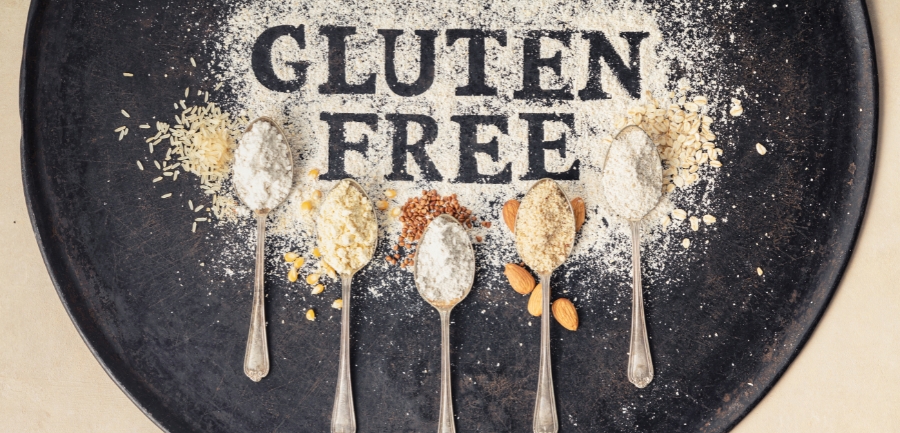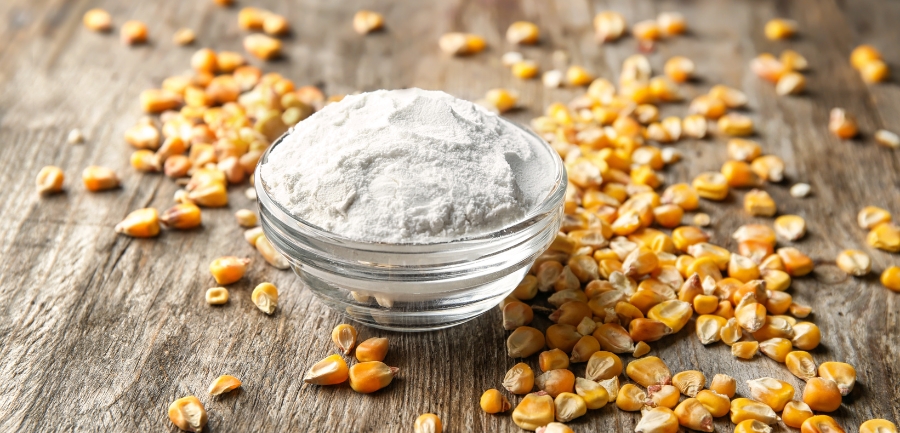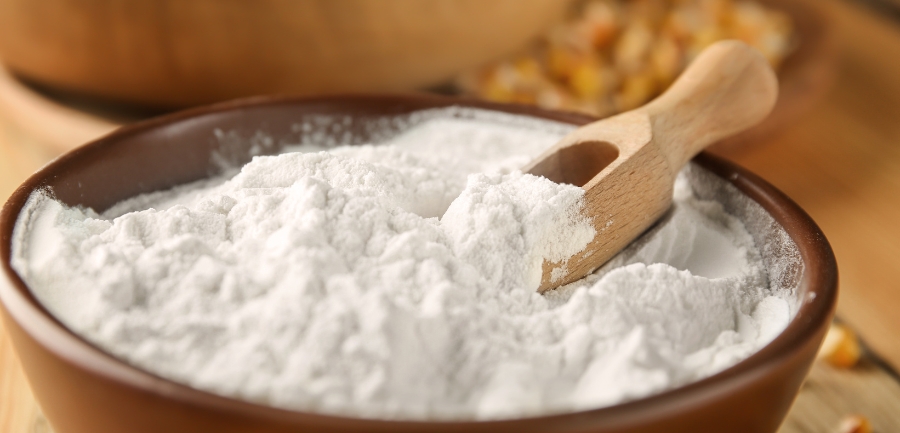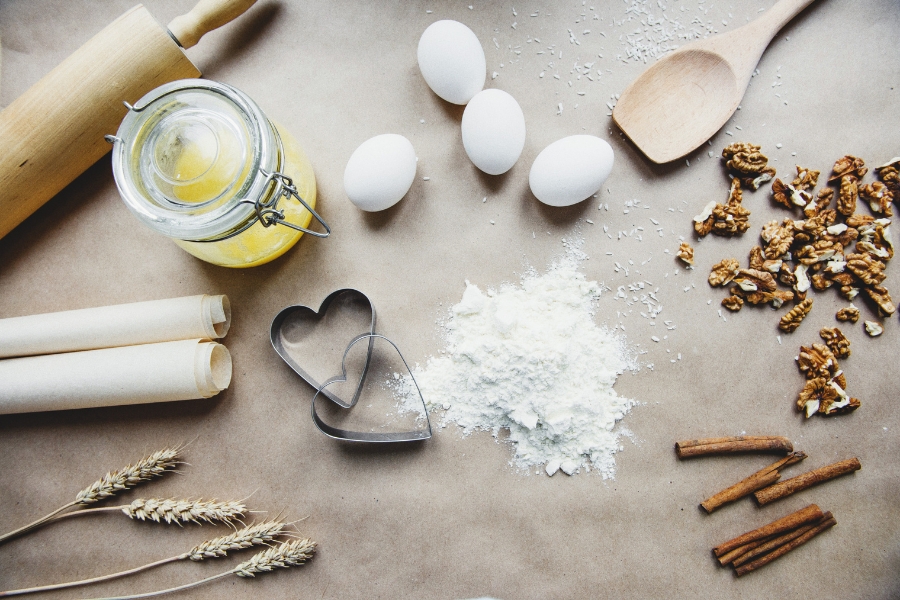If you’ve ever tried your hand at baking, you’ve probably encountered baking powder. It’s that magic ingredient that makes cakes rise and cookies fluff up. But have you ever paused to wonder what’s really in it? Questions like “Is Baking Powder Gluten-Free?” might have crossed your mind, especially if you or someone you know is gluten-sensitive.
Table of Contents
As a baker and not only, indulging your curiosity about baking powder is important, but so is keeping your family safe. Anyone who has ever wondered what the heck those mysterious cans and boxes in their kitchen contained may find this guide useful.
Let’s take a closer look at the role of baking powder in your favorite recipes, discuss the gluten question, and explore a few possible alternatives. Why don’t you pour yourself a nice cup of tea (or coffee if you prefer), and let’s delve into the captivating realm of baking powder together I’m looking forward to a tasty adventure!
Is Baking Powder Gluten-Free?

Gluten in baking powder? Many people, especially those who follow a gluten-free diet, have been puzzled by this question. Although baking powder is commonly used in many recipes, it’s important for individuals with dietary restrictions to be aware of its gluten content. Let’s demystify this common baking ingredient and uncover whether or not it’s safe for the gluten-free community.
Does Baking Powder Have Gluten?
Hey, gluten-free friends, this section’s for you! Gluten, that tricky protein found in wheat, barley, and rye, can be a real concern for those with gluten sensitivities or celiac disease. But what about baking powder? Is it sneaking gluten into your favorite baked goods?
Most baking powder is a mix of a carbonate or bicarbonate and a weak acid, and it’s this combination that creates those delightful bubbles in your baked treats. Generally speaking, baking powder doesn’t contain gluten. However, some brands might include additives or starches that could contain gluten, so it’s not always a straightforward answer.
Here’s what you can do:
- Check the Label: Gluten-free should be clearly marked if it’s certified. If not, look for ingredients like wheat starch that signal gluten.
- Go for Trusted Brands: Some brands specifically cater to gluten-free baking, making your choice a bit easier.
- When in Doubt, DIY: You can make your own baking powder with cream of tartar, baking soda, and cornstarch. That way, you know exactly what’s going into it!
Is All Baking Powder Gluten-Free?
Nope, not all baking powder is created equal. While many brands are gluten-free, some might contain ingredients that aren’t safe for those avoiding gluten. It’s a bit of a baking minefield, but don’t worry; we’re here to guide you through it.
- Research Ahead of Time: Look up brands online or consult gluten-free forums to find tried-and-true options.
- Ask for Help: Your local grocery store might have knowledgeable staff who can steer you in the right direction.
- Remember, It’s Your Kitchen: You have control over what goes into your food. Take charge, read those labels, and choose what’s best for you and your loved ones.
Understanding baking powder’s gluten content might feel like a culinary detective’s job, but with these tips, you’ll be baking gluten-free in no time!
Alternatives and Substitutes for Baking Powder

Whether you’re navigating dietary restrictions or simply running out of baking powder, exploring alternatives is a kitchen adventure waiting to happen. Let’s see what we can do in the baking world with maize flour and other alternatives to traditional baking powder.
Can I Use Cornstarch Instead of Baking Powder?
Cornstarch as a substitute for baking powder? You bet! Though it might sound surprising, cornstarch can step in when baking powder’s not an option. Here’s how:
- How and When to Substitute: Cornstarch alone won’t act as a leavening agent, but combine it with baking soda and an acid, and you’ve got a baking powder alternative. Ideal for thickening and lightening baked goods.
- Comparison Between Baking Powder and Cornstarch: While baking powder is a ready-made mix, using cornstarch requires a bit more culinary finesse. It can be a gluten-free option but will need careful measurement.
How to Make Pancakes Without Baking Powder
Pancakes without baking powder? Fluffy and delicious pancakes are still within reach! Here’s how:
- Techniques: Whipping egg whites or using carbonated water can add the desired fluffiness.
- Recipes: From banana-based pancakes to yogurt-infused options, there’s no shortage of scrumptious alternatives.
- Tips: Patience and experimentation can lead to your perfect baking powder-free pancake recipe.
Can You Make Cookies Without Baking Powder?
Of course! Cookies without baking powder are not only possible but can be utterly delectable. Here’s what you need to know: using baking soda, whipped eggs, or even omitting leavening agents entirely can lead to delightful results.
Examples of Cookie Recipes Without Baking Powder
Yes, you can still indulge in delicious cookies without using baking powder. Here are some examples of cookie recipes and how they can be made without baking powder:
- Classic Shortbread Cookies: Made with just butter, sugar, and flour, shortbread cookies are tender and crumbly. Without any leavening agents, they have a melt-in-your-mouth quality that’s hard to resist.
- Chewy Brownie Cookies: These fudgy delights can be made with melted chocolate, butter, sugar, eggs, and a touch of flour. The eggs provide structure, and the absence of baking powder gives them a dense, chewy texture.
- Flourless Peanut Butter Cookies: If you’re looking for a gluten-free option, these cookies are a great choice. Mix peanut butter, sugar, and an egg, and you have a simple yet satisfying treat.
- Almond Macaroons: These chewy, almond-flavored cookies are often made with almond paste, sugar, and egg whites. The whipped egg whites act as the rising agent, eliminating the need for baking powder.
- No-Bake Oatmeal Cookies: With a combination of oats, sugar, butter, milk, and cocoa powder, you can create delicious cookies without even turning on the oven. They’re quick, easy, and entirely baking powder-free.
If you try cookie recipes that don’t call for baking powder, you might find new textures, flavors, and ways to bake. These cookies are a fun alternative if you’re looking to spice up your baking repertoire but are avoiding baking powder for dietary or other reasons.
Is Baking Powder Bad for You?

Baking powder: a key ingredient in many recipes, but is it good for your health? In this section, we will discuss the typical worries and misunderstandings related to baking powder. We’ll go over its health benefits and explain how it may be worked into a variety of meal patterns.
Is Baking Powder the Same as Corn Starch?
Though baking powder and cornstarch may share shelf space in your pantry, they are not the same. Let’s break down their differences and similarities:
- Differences: Baking powder acts as a leavening agent, causing the dough to rise, while cornstarch is primarily used to thicken sauces and fillings. Their chemical compositions are different, with baking powder containing an acid and a base, whereas cornstarch is just a carbohydrate.
- Similarities: Both are white powders often used in baking and cooking, and both can be part of gluten-free recipes.
- Understanding Their Unique Roles: Baking powder provides lift; cornstarch provides thickness. Knowing when to use each is key to culinary success.
Does Baking Powder Have Carbs?
Wondering about baking powder and carbs? Here’s what you need to know:
- Analyzing the Carbohydrate Content: Baking powder is mostly used in small quantities, so its carb content is usually minimal. However, some types might contain cornstarch, adding a small amount of carbohydrates.
- Suitable for Low-Carb Diets? Generally, the carbs in baking powder shouldn’t impact a low-carb diet significantly, but it’s always wise to check the label if you’re strictly monitoring carbs.
Is Baking Powder Keto Friendly?
Embracing a keto lifestyle and wondering about baking powder? Let’s assess:
- Assessing Its Compatibility with Keto Diets: Baking powder is typically low in carbs, making it compatible with a ketogenic diet.
- Recommendations for Keto Bakers: Opt for baking powder without added starches or consider making your own with cream of tartar and baking soda to ensure it aligns with your keto goals.
To Wrap It Up
Baking powder is not just a basic item found in the kitchen; it plays a crucial role in numerous beloved dishes. However, as we have seen, it is crucial to be aware of its gluten content, possible alternatives, and health issues when cooking and baking. In the kitchen, as in other areas of life, knowledge is power. Read labels, get advice from reliable sources, and try new things. Your culinary adventure is one of a kind; dive headfirst into it.
I value your opinion very highly. Do you know of any substitutes for baking powder? Can you recommend a good brand of gluten-free baking powder? Put in your two cents and talk about whatever’s on your mind. We have the potential to unite a group of knowledgeable and creative bakers.
FAQs
Is All Baking Powder Gluten-Free?
No, not all baking powders are gluten-free. Some may contain starch derived from wheat, so it’s important to read labels or choose brands labeled as gluten-free.
Do Gluten-Free Cakes Need Baking Powder?
No, gluten-free cakes can be made without baking powder. Using alternatives like whipped egg whites or gluten-free baking powder can yield fluffy and delicious results.
Does Baking Soda Powder Have Gluten?
Baking soda, unlike baking powder, doesn’t contain gluten. It’s a single ingredient, sodium bicarbonate, without any additives or starches that may contain gluten.
Why is Baking Soda Not Gluten-Free?
Baking soda is indeed gluten-free. Any misconception may arise from confusion between baking soda and baking powder, the latter of which might contain gluten.

